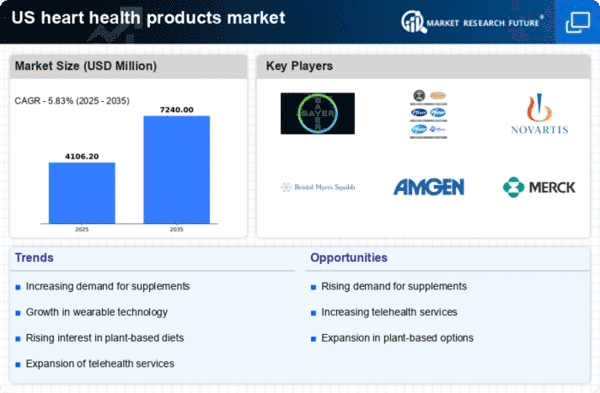Rise in Preventive Healthcare
The shift towards preventive healthcare is reshaping the heart health-products market in the US. Consumers are increasingly recognizing the importance of prevention over treatment, leading to a growing interest in products that can help mitigate heart disease risks. This trend is reflected in the rising sales of dietary supplements and functional foods designed to support cardiovascular health. In 2025, the preventive healthcare market is anticipated to reach $4 trillion, with a significant portion attributed to heart health-related products. This proactive approach to health management is likely to drive innovation and investment in the heart health-products market, as companies strive to develop effective solutions that cater to health-conscious consumers.
Aging Population and Heart Health
The demographic shift towards an aging population in the US significantly influences the heart health-products market. As individuals age, the risk of heart-related ailments increases, leading to a greater demand for products that support cardiovascular health. By 2030, it is projected that approximately 20% of the US population will be aged 65 and older, creating a substantial market for heart health solutions. This demographic is more likely to invest in supplements, medications, and health monitoring devices aimed at maintaining heart health. Consequently, the heart health-products market is expected to expand as manufacturers tailor their offerings to meet the specific needs of older consumers, thereby enhancing market growth.
Growing Awareness of Heart Health
The increasing awareness of heart health among the US population is a pivotal driver for the heart health-products market. Educational campaigns and health initiatives have led to a heightened understanding of cardiovascular diseases and their risk factors. As a result, consumers are more inclined to seek products that promote heart health, such as supplements, functional foods, and lifestyle products. According to recent data, nearly 48% of adults in the US actively monitor their heart health, which has contributed to a surge in demand for heart health-related products. This trend is likely to continue as more individuals prioritize preventive measures and adopt healthier lifestyles, thereby propelling the heart health-products market forward.
Technological Advancements in Health Monitoring
Technological advancements in health monitoring are playing a crucial role in the evolution of the heart health-products market. Wearable devices and mobile applications that track heart rate, blood pressure, and other vital signs are becoming increasingly popular among consumers. These innovations not only empower individuals to monitor their heart health but also facilitate early detection of potential issues. The market for wearable health technology is projected to grow at a CAGR of 25% through 2027, indicating a robust demand for integrated health solutions. As technology continues to advance, the heart health-products market is likely to benefit from enhanced consumer engagement and a greater emphasis on personalized health management.
Increased Focus on Nutrition and Lifestyle Changes
The growing focus on nutrition and lifestyle changes is a significant driver of the heart health-products market. Consumers are becoming more educated about the impact of diet and exercise on cardiovascular health, leading to a surge in demand for heart-healthy foods and supplements. The market for heart-healthy foods is expected to reach $100 billion by 2026, reflecting a shift towards healthier eating habits. This trend is further supported by the rise of plant-based diets and the popularity of functional foods that offer specific health benefits. As consumers prioritize nutrition and lifestyle modifications, the heart health-products market is poised for continued growth, with companies adapting their offerings to align with these evolving consumer preferences.






















Leave a Comment